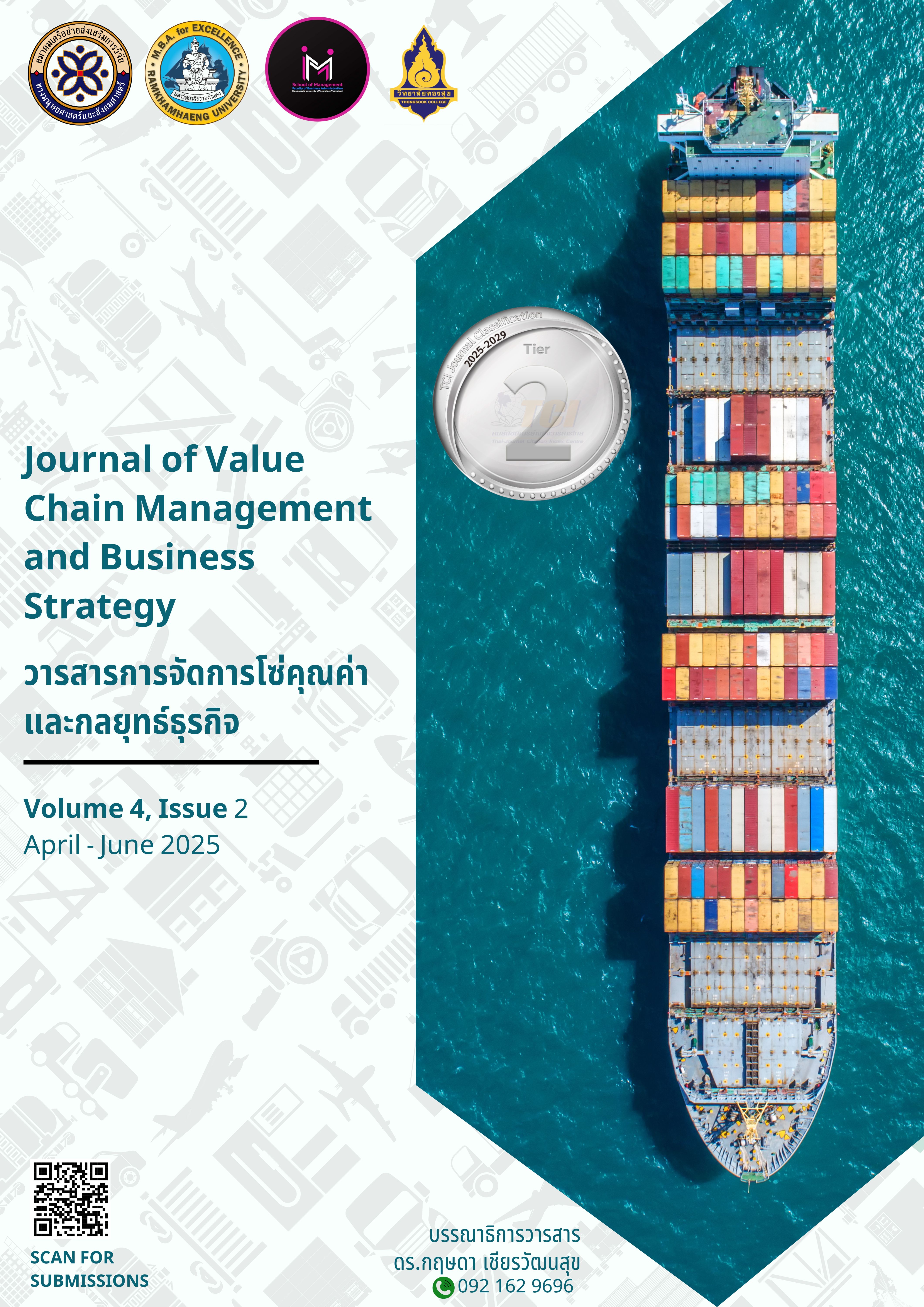ทักษะดิจิทัลและการยอมรับเทคโนโลยีที่ส่งผลต่อการประยุกต์ใช้ปัญญาประดิษฐ์ ของพนักงานบริษัทเอกชนเขตกรุงเทพมหานคร
คำสำคัญ:
ทักษะดิจิทัล , การยอมรับเทคโนโลยี, การประยุกต์ใช้ปัญญาประดิษฐ์บทคัดย่อ
การศึกษานี้มีวัตถุประสงค์เพื่อศึกษาทักษะดิจิทัลและการยอมรับเทคโนโลยีที่ส่งผลต่อการประยุกต์ใช้ปัญญาประดิษฐ์ของพนักงานบริษัทเอกชนเขตกรุงเทพมหานคร กลุ่มตัวอย่างที่ใช้ในการวิจัยนี้ คือ พนักงานบริษัทเอกชนในเขตกรุงเทพมหานคร จำนวน 385 คน ด้วยวิธีการสุ่มแบบตามสะดวก โดยทำการเก็บรวบรวมข้อมูลด้วยแบบสอบถาม และวิเคราะห์ข้อมูลด้วยสถิติเชิงพรรณนา ได้แก่ ค่าความถี่ ร้อยละ ค่าเฉลี่ย และส่วนเบี่ยงเบนมาตรฐาน และทดสอบสมมติฐานด้วยการวิเคราะห์การถดถอยพหุคูณ
ผลการวิจัยพบว่า การรับรู้ถึงประโยชน์ของเทคโนโลยีมีผลต่อการการประยุกต์ใช้ปัญญาประดิษฐ์มากที่สุด รองลงมาการรับรู้ถึงความง่ายในการใช้งาน และสุดท้าย การแก้ปัญหาและพัฒนา AI ซึ่งตัวแปรทั้ง 3 ตัว สามารถอธิบายความผันแปรของการประยุกต์ใช้ AI ในการทำงาน พนักงานบริษัทเอกชน เขตกรุงเทพมหานครได้ร้อยละ 98.5 อย่างมีนัยสำคัญทางสถิติที่ระดับ .05 ดังนั้น องค์กรเอกชนต่าง ๆ ควรให้ความสำคัญกับการส่งเสริมการรับรู้ประโยชน์ของ AI ควบคู่กับการออกแบบระบบที่ใช้งานง่ายและการพัฒนาทักษะดิจิทัลของพนักงาน เพื่อสนับสนุนการประยุกต์ใช้ AI ในการทำงานอย่างมีประสิทธิภาพและยั่งยืน
เอกสารอ้างอิง
มณีรัศมิ์ พัฒนสมบัติสุข. (2564). การตรวจสอบคุณภาพเครื่องมือวิจัยทางการพยาบาลและสังคมศาสตร์. วารสารเครือข่ายวิทยาลัยพยาบาลและการสาธารณสุขภาคใต้, 8(2), 329-343.
Afroogh, S., Akbari, A., Malone, E., Kargar, M., & Alambeigi, H. (2024). Trust in AI: progress, challenges, and future directions. Humanities and Social Sciences Communications, 11(1), 1-30.
Babashahi, L., Barbosa, C. E., Lima, Y., Lyra, A., Salazar, H., Argôlo, M., ... & Souza, J. M. D. (2024). AI in the workplace: A systematic review of skill transformation in the industry. Administrative Sciences, 14(6), 127. https://doi.org/10.3390/admsci14060127
Calitz, A. P., Poisat, P., & Cullen, M. (2017). The future African workplace: The use of collaborative robots in manufacturing. SA Journal of Human Resource Management, 15(1), 1-11.
Chassignol, M., Khoroshavin, A., Klimova, A., & Bilyatdinova, A. (2018). Artificial Intelligence trends in education: a narrative overview. Procedia computer science, 136, 16-24. https://doi.org/10.1016/j.procs.2018.08.233
Cochran, W. G. (1977). Sampling techniques (3rd ed.). John Wiley & Sons.
Cronbach, L. J. (1970). Essentials of psychological test (5th ed.). Harper Collins.
Davis, F. D. (1989). Perceived usefulness, perceived ease of use, and user acceptance of information technology. MIS quarterly, 13(3), 319-340.
DeLone, W. H., & McLean, E. R. (1992). Information systems success: The quest for the dependent variable. Information systems research, 3(1), 60-95.
DeLone, W. H., & McLean, E. R. (2003). The DeLone and McLean model of information systems success: a ten-year update. Journal of management information systems, 19(4), 9-30.
Dwivedi, Y. K., Hughes, L., Ismagilova, E., Aarts, G., Coombs, C., Crick, T., ... & Williams, M. D. (2021). Artificial Intelligence (AI): Multidisciplinary perspectives on emerging challenges, opportunities, and agenda for research, practice and policy. International journal of information management, 57, 101994. https://doi.org/10.1016/j.ijinfomgt.2019.08.002
Goodfellow, I., Bengio, Y., Courville, A., & Bengio, Y. (2016). Deep learning (Vol. 1, No. 2). MIT press.
Ikhsan, R. B., Fernando, Y., Prabowo, H., Gui, A., & Kuncoro, E. A. (2025). An empirical study on the use of artificial intelligence in the banking sector of Indonesia by extending the TAM model and the moderating effect of perceived trust. Digital Business, 5(1), 100103. https://doi.org/10.1016/j.digbus.2024.100103
Lee, C. P. (2024). Design, development, and deployment of context-adaptive AI systems for enhanced user adoption. In Extended Abstracts of the CHI Conference on Human Factors in Computing Systems (pp. 1-5). Honolulu, HI.
Long, D., & Magerko, B. (2020). What is AI literacy? Competencies and design considerations. In Proceedings of the 2020 CHI conference on human factors in computing systems (pp. 1-16). Honolulu, HI.
Marangunić, N., & Granić, A. (2015). Technology acceptance model: a literature review from 1986 to 2013. Universal access in the information society, 14, 81-95. https://doi.org/10.1007/s10209-014-0348-1
Mikeladze, T., Meijer, P. C., & Verhoeff, R. P. (2024). A comprehensive exploration of artificial intelligence competence frameworks for educators: A critical review. European Journal of Education, 59(3), e12663. https://doi.org/10.1111/ejed.12663
Misra, S. K., Sharma, S. K., Gupta, S., & Das, S. (2023). A framework to overcome challenges to the adoption of artificial intelligence in Indian Government Organizations. Technological Forecasting and Social Change, 194, 122721. https://doi.org/10.1016/j.techfore.2023.122721
Russell, S., & Norvig, P. (2020). Artificial intelligence: A modern approach (4th ed.). Pearson.
Shrestha, Y. R., Krishna, V., & von Krogh, G. (2021). Augmenting organizational decision-making with deep learning algorithms: Principles, promises, and challenges. Journal of Business Research, 123, 588-603. https://doi.org/10.1016/j.jbusres.2020.09.068
Wang, Y., Kung, L., Wang, W. Y. C., & Cegielski, C. G. (2018). An integrated big data analytics-enabled transformation model: Application to health care. Information & Management, 55(1), 64-79. https://doi.org/10.1016/j.im.2017.04.001
Zhang, C., & Lu, Y. (2021). Study on artificial intelligence: The state of the art and future prospects. Journal of Industrial Information Integration, 23, 100224. https://doi.org/10.1016/j.jii.2021.100224
ดาวน์โหลด
เผยแพร่แล้ว
รูปแบบการอ้างอิง
ฉบับ
ประเภทบทความ
สัญญาอนุญาต
ลิขสิทธิ์ (c) 2025 วารสารการจัดการโซ่คุณค่าและกลยุทธ์ธุรกิจ

อนุญาตภายใต้เงื่อนไข Creative Commons Attribution-NonCommercial-NoDerivatives 4.0 International License.




